#COVID response strategy
Explore tagged Tumblr posts
Text
I think the left completely failed to form an effective covid-safety strategy.
First they failed by putting far too little effort into winning systematic changes (access to health care, access to paid sick leave, ventilation of work- and public spaces, etc) and putting most of the focus on individual behaviors that they could judge individuals for (vaccines and above all masking).
Their second failure was to then primarily rely on punitive pressure and scolding people to achieve that behavior. Which meant that this strategy only kind of worked a little when they had enough people to keep up that pressure. The moment that pressure wasn't enough anymore, most people stopped masking because they'd only even done it because of external pressure.
This left us with nothing. No systematic changes and no group safety.
At that point, the third failure was to change nothing once it became abundantly clear that these tactics weren't working. People wrote comics and long reads and video essays about the lack of solidarity of people who stopped masking, and while there was truth there, that didn't change anything.
Yet at no point did people take stock, re-assess and change strategy. To this day people are just doing the same thing over and over again and expecting different results. In fact, people seem to just double down. Where they talked about a range of safety measures in the past they've switched to only talking about masking. Where they used a range of tactics in the past, they've switched to only scolding.
And when you challenge them, the response is something like "But I am right, this is unjust, so people should change when I tell them it is unjust". But that's not a strategy. Creating societal change doesn't require being right, it requires having an effective plan on how to actually achieve real change.
And I don't have a full draft of what would make an effective strategy. I think unions could play a big role in achieving things paid sick leave and proper ventilation. But I don't have all the answers either. I think there needs to be an acknowledgement that what's currently happening isn't working, and that a new strategy is long overdue.
3K notes
·
View notes
Text
Mostly correct, but at the same time I find there's a mistaken belief that holding any form of anger or hatred will corrupt you, which I think is technically true if you take it to it's natural extreme, but once again I have to make the argument of self-responsibility.
Anger is a very valuable tool when applied correctly (a lengthy topic I won't go into but if you learn to use your emotional bursts rationally it can be very useful in various ways), and it's appropriate to get mad at fools for being fools. I'm not speaking towards actively attacking them, obviously, but when it comes to my blog where I'm not in the process of trying to talk to these people and actively attempting to avoid them, I don't think it matters as much as the joy I feel stringing together a fun insult (Although as my sweet ferny friend has pointed out, my angle of attack was a bit ableist and not really against the substance of their flaws.)
I entirely agree that being hateful directly towards them is entirely pointless with few exceptions (If you're in a situation where someone isn't ever going to change, what you say only matters to those viewing the conversation that's opinion will be potentially up for change. In that case, there is value in lowering yourself to their level and responding to their lukewarm insults with some spicy retort once you've already given them the chance(s) to be civil in scenarios where onlookers would respond positively to that), because ultimately the only way you'll ever convince them of anything is to make them ask the questions themselves.
As I said, I think you're right, but people choose to believe the things they are told. I believe it's ultimately just as dehumanizing to consider them as simply being "unable to see the propaganda for what it is because of a lack of education and active malice towards them" as to call them a pile of spare parts.
There is value in peace, but it is better to be a warrior in a garden then a gardener in a war, and I'm telling you for sure that these people aren't going to de-radicalize. The best option we have for the future is that they spend their whole lives hating imaginary enemies so they don't have to change and then die quietly, having only harmed people psychologically with their words and actions.
Edit: Which, when you consider they elected the people currently doing massive damage to people on the basis of wanting them to do damage to those people, it sort of strikes me that it's already long past that point.
At the very least, making people hate bigots isn't a problem that I see as being as problematic as the bigots themselves.
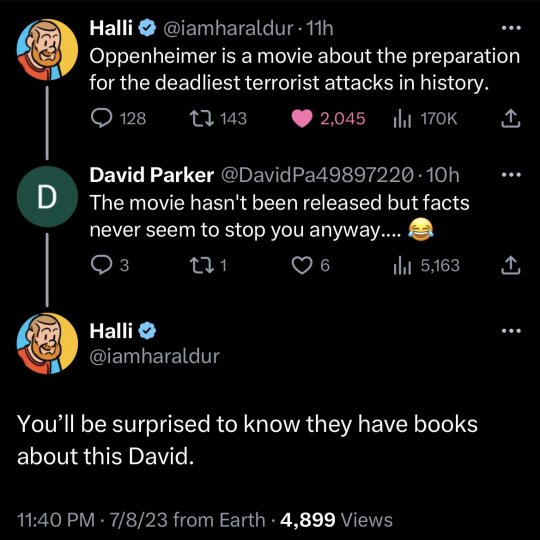
You know Elon probably saw this and was super mad he still can't fire Halli.
#fyi new bestie I do wish I could agree with you#I really don't like pointless negative emotions and I wish that peace was the option and we could just rationally tell people the truth#I get the fear of spreading hate in others that's a good point but shouldn't everyone hate bigots and fascists#Also I have like fifty more things to say like how the 9/10 of their group that are following the 1/10 aren't actually the ones speaking#When you speak to propaganda addled individuals they are just quoting the grifters and propagandists that gave them their ideas#So actually the best forms of insults are towards them and it's best to address the asshole they got the shit from directly#This lets you step past them and metaphorically address Jordan Peterson's insane beliefs that have been imprinted into them#Which I didn't do as the conversation is about them and as I said I can't get behind removing agency from people#They chose to believe the lies and ignore those who speak the truth#I can't tho I have carpal tunnel but I love everything your putting down#I am picking it up and putting it on my shelf#I've spent multiple years trying to convince the terminally online they are being deceived and I'm telling you it doesn't matter#No matter what you say their response will always be the same and people respond easily to insults towards those perceived to deserve them#and in a better time I'd say it would be better to do as you say#Covid might not even be top 5 worst things in this decade#The only ones who will change are only at best going to use your conversation as a stepping stone to admitting somethings wrong but that is#I can't even make up a number it's so rare I can only remember six cases of it happening#I tried so hard#I had so many strategies and plans and it just doesn't fucking matter when they think you're LITERALLY A LIZARD PERSON
24K notes
·
View notes
Text
COVID-19 Response and Pandemic Preparedness: Redux
As COVID-19 has moved to an endemic phase (constant presence, not spreading out of control or taxing health care resources), I’ve started to look back at what transpired since early-2020 and what was learned, known, and now, embedded (perhaps) in our culture and our health care industry. Suffice to say, the review is somewhat mind boggling. My work and my firm, H2 Healthcare, were heavily…
View On WordPress
#Biden Response Plan#CMS#Compliance#COVID 19#Industry Outlook#infection control#litigation#Management#pandemic#Policy#public health#Regulations#States#Strategy#Trends#Vaccines#Washington
0 notes
Text
"Since it was first identified in 1983, HIV has infected more than 85 million people and caused some 40 million deaths worldwide.
While medication known as pre-exposure prophylaxis, or PrEP, can significantly reduce the risk of getting HIV, it has to be taken every day to be effective. A vaccine to provide lasting protection has eluded researchers for decades. Now, there may finally be a viable strategy for making one.
An experimental vaccine developed at Duke University triggered an elusive type of broadly neutralizing antibody in a small group of people enrolled in a 2019 clinical trial. The findings were published today [May 17, 2024] in the scientific journal Cell.
“This is one of the most pivotal studies in the HIV vaccine field to date,” says Glenda Gray, an HIV expert and the president and CEO of the South African Medical Research Council, who was not involved in the study.
A few years ago, a team from Scripps Research and the International AIDS Vaccine Initiative (IAVI) showed that it was possible to stimulate the precursor cells needed to make these rare antibodies in people. The Duke study goes a step further to generate these antibodies, albeit at low levels.
“This is a scientific feat and gives the field great hope that one can construct an HIV vaccine regimen that directs the immune response along a path that is required for protection,” Gray says.
-via WIRED, May 17, 2024. Article continues below.
Vaccines work by training the immune system to recognize a virus or other pathogen. They introduce something that looks like the virus—a piece of it, for example, or a weakened version of it—and by doing so, spur the body’s B cells into producing protective antibodies against it. Those antibodies stick around so that when a person later encounters the real virus, the immune system remembers and is poised to attack.
While researchers were able to produce Covid-19 vaccines in a matter of months, creating a vaccine against HIV has proven much more challenging. The problem is the unique nature of the virus. HIV mutates rapidly, meaning it can quickly outmaneuver immune defenses. It also integrates into the human genome within a few days of exposure, hiding out from the immune system.
“Parts of the virus look like our own cells, and we don’t like to make antibodies against our own selves,” says Barton Haynes, director of the Duke Human Vaccine Institute and one of the authors on the paper.
The particular antibodies that researchers are interested in are known as broadly neutralizing antibodies, which can recognize and block different versions of the virus. Because of HIV’s shape-shifting nature, there are two main types of HIV and each has several strains. An effective vaccine will need to target many of them.
Some HIV-infected individuals generate broadly neutralizing antibodies, although it often takes years of living with HIV to do so, Haynes says. Even then, people don’t make enough of them to fight off the virus. These special antibodies are made by unusual B cells that are loaded with mutations they’ve acquired over time in reaction to the virus changing inside the body. “These are weird antibodies,” Haynes says. “The body doesn’t make them easily.”
Haynes and his colleagues aimed to speed up that process in healthy, HIV-negative people. Their vaccine uses synthetic molecules that mimic a part of HIV’s outer coat, or envelope, called the membrane proximal external region. This area remains stable even as the virus mutates. Antibodies against this region can block many circulating strains of HIV.
The trial enrolled 20 healthy participants who were HIV-negative. Of those, 15 people received two of four planned doses of the investigational vaccine, and five received three doses. The trial was halted when one participant experienced an allergic reaction that was not life-threatening. The team found that the reaction was likely due to an additive in the vaccine, which they plan to remove in future testing.
Still, they found that two doses of the vaccine were enough to induce low levels of broadly neutralizing antibodies within a few weeks. Notably, B cells seemed to remain in a state of development to allow them to continue acquiring mutations, so they could evolve along with the virus. Researchers tested the antibodies on HIV samples in the lab and found that they were able to neutralize between 15 and 35 percent of them.
Jeffrey Laurence, a scientific consultant at the Foundation for AIDS Research (amfAR) and a professor of medicine at Weill Cornell Medical College, says the findings represent a step forward, but that challenges remain. “It outlines a path for vaccine development, but there’s a lot of work that needs to be done,” he says.
For one, he says, a vaccine would need to generate antibody levels that are significantly higher and able to neutralize with greater efficacy. He also says a one-dose vaccine would be ideal. “If you’re ever going to have a vaccine that’s helpful to the world, you’re going to need one dose,” he says.
Targeting more regions of the virus envelope could produce a more robust response. Haynes says the next step is designing a vaccine with at least three components, all aimed at distinct regions of the virus. The goal is to guide the B cells to become much stronger neutralizers, Haynes says. “We’re going to move forward and build on what we have learned.”
-via WIRED, May 17, 2024
#hiv#aids#aids crisis#virology#immunology#viruses#vaccines#infectious diseases#vaccination#immune system#public health#medicine#healthcare#hiv aids#hiv prevention#good news#hope#medical news
921 notes
·
View notes
Text
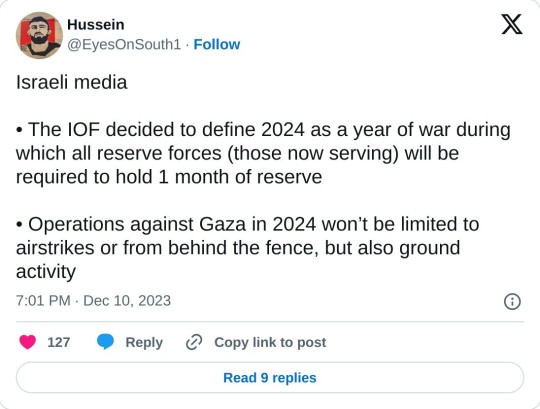
3 thoughts on this:
Economy - Israel's economy took a hit in October that was comparable to the economic tremors caused by the COVID-19 outbreak. It is effectively in a major recession today. The longer they drag out this war, the worse their economic condition will be. Foreign capital will continue leaving the country as it seems incapable of stabilising. While the continued use of reserves means 300,000 Israelis will be unable to work, not to mention the millions of dollars Israel has to spend to mobilise its reserve every day. The longer the war goes on, the more people will end up leaving the country. 470,000 have left in October and November with no intention of returning while over 300,000 settlers are internally displaced. Both of those numbers are bound to go up as the war continues. This means that Israel is missing hundreds of thousands of Israeli workers. A few weeks ago, Israel struck a deal with the Indian government to get 100,000 workers after tens of thousands of worker migrants fled the country. That plan fell through thanks to Indian trade unions. Now Israel is turning to African States in a desperate attempt to replace the Gazan workers it's currently genociding. We will see if that plan works as Africans are by and large pro Palestine. Plus the Yemeni naval blockade is growing more and more intense every week as a direct response to the genocide in Gaza. In short, Israel's economy can't withstand a long war. America cannot help prop up the economy as it will soon be facing its major economy issues in the coming years including a housing crisis and likely a recession.
Military defeats - Israel cannot defeat Hamas. It cannot win a war inside Gaza. It failed to do so in 2014, it's failing right now. It has lost hundreds of military vehicles including the (formerly) vaunted Merkava-4. The estimated number of injured soldiers stands at 10,000+ while the Resistance is still intact and capable of carrying out dozens of military operations against IDF and the surrounding cities and settlements every day. The IDF has never looked more weak than it is right now. Hezbollah has been employing a military strategy dubbed the escalation ladder, in which one end of the ladder is no war and the other end is total war. It has continuously escalated against Israel, attacking deeper and deeper into its territory, and it will continue until there's open war between Israel and Lebanon. The point of the escalation is to give Israel time to leave Gaza but as that's not something the Israeli government is planning on doing, we're looking at a region war in 2024 (so far we have a regional conflict and whilebits serious, it's not yet war). Just like it can't win in Gaza, Israel can't defeat Hezbollah and occupy Southern Lebanon like its leaders have been threatening to. It certainly can't take on the Ansar Allah group in Yemen.
West Bank - every week, there are clashes between Israeli forces and the Resistance in the West Bank and it's growing more and more intense. The best way to describe the region is 'powder keg.' Israel has responded to Oct 7th by detaining thousands of Palestinians and killing hundreds. There's a growing popularity of Al Qassam Brigades and other militant groups in Gaza. There also seems to be coordination between the Gazan and West Bank resistance groups, as in they would carry out operations at the same time. The longer the war on Gaza goes on, the more likely that war will also break out in the West Bank.
Many, many more Palestinians will die. This plan, more than anything, is a call for the continued slaughter of Palestinians in Gaza.
But the longer this goes on, the closer Israel gets to collapsing.
#yemen#jerusalem#tel aviv#current events#palestine#free palestine#gaza#free gaza#news on gaza#palestine news#news update#war news#war on gaza
1K notes
·
View notes
Text
Next thing you know, we're using freezer trucks for morgues.
Trump has always had a tenuous grasp of reality.

Four years ago today, Trump tried to downplay his failed response to the raging pandemic: We lose many more people to automobile accidents
#covid pandemic#trump botched the pandemic response#trump thought denial was a smart strategy on covid#no wonder he went bankrupt so often
101 notes
·
View notes
Text
Mild Primary or Breakthrough SARS-CoV-2 Infection Promotes Autoantibody Production in Individuals with and without Neuro-PASC - Published Aug 26, 2024
Abstract Patients with long COVID can develop humoral autoimmunity after severe acute SARS-CoV-2 infection. However, whether similar increases in autoantibody responses occur after mild infection and whether vaccination prior to SARS-CoV-2 breakthrough infection can limit autoantibody responses is unknown. In this study, we demonstrate that mild SARS-CoV-2 infection increases autoantibodies associated with rheumatic autoimmune diseases and diabetes in most individuals, regardless of vaccination status prior to infection. However, patients with long COVID and persistent neurologic and fatigue symptoms (neuro-PASC) have substantially higher autoantibody responses than convalescent control subjects at an average of 8 mo postinfection. Furthermore, high titers of systemic lupus erythematosus– and CNS-associated autoantibodies in patients with neuro-PASC are associated with impaired cognitive performance and greater symptom severity. In summary, we found that mild SARS-CoV-2 primary and breakthrough infections can induce persistent humoral autoimmunity in both patients with neuro-PASC and healthy COVID convalescents, suggesting that a reappraisal of mitigation strategies against SARS-CoV-2 is warranted to prevent transmission and potential development of autoimmunity.
#covid#mask up#pandemic#covid 19#wear a mask#coronavirus#public health#sars cov 2#still coviding#wear a respirator
389 notes
·
View notes
Text
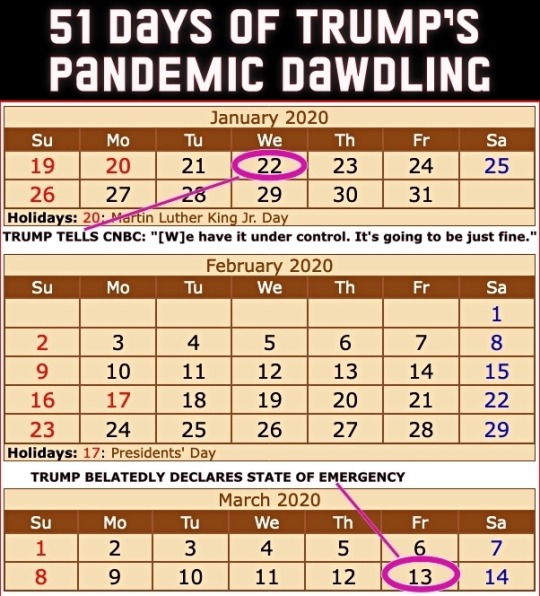
Four years ago today (March 13th), then President Donald Trump got around to declaring a national state of emergency for the COVID-19 pandemic. The administration had been downplaying the danger to the United States for 51 days since the first US infection was confirmed on January 22nd.
From an ABC News article dated 25 February 2020...
CDC warns Americans of 'significant disruption' from coronavirus
Until now, health officials said they'd hoped to prevent community spread in the United States. But following community transmissions in Italy, Iran and South Korea, health officials believe the virus may not be able to be contained at the border and that Americans should prepare for a "significant disruption." This comes in contrast to statements from the Trump administration. Acting Department of Homeland Security Secretary Chad Wolf said Tuesday the threat to the United States from coronavirus "remains low," despite the White House seeking $1.25 billion in emergency funding to combat the virus. Larry Kudlow, director of the National Economic Council, told CNBC’s Kelly Evans on “The Exchange” Tuesday evening, "We have contained the virus very well here in the U.S." [ ... ] House Speaker Nancy Pelosi called the request "long overdue and completely inadequate to the scale of this emergency." She also accused President Trump of leaving "critical positions in charge of managing pandemics at the National Security Council and the Department of Homeland Security vacant." "The president's most recent budget called for slashing funding for the Centers for Disease Control, which is on the front lines of this emergency. And now, he is compounding our vulnerabilities by seeking to ransack funds still needed to keep Ebola in check," Pelosi said in a statement Tuesday morning. "Our state and local governments need serious funding to be ready to respond effectively to any outbreak in the United States. The president should not be raiding money that Congress has appropriated for other life-or-death public health priorities." She added that lawmakers in the House of Representatives "will swiftly advance a strong, strategic funding package that fully addresses the scale and seriousness of this public health crisis." Senate Minority Leader Chuck Schumer also called the Trump administration's request "too little too late." "That President Trump is trying to steal funds dedicated to fight Ebola -- which is still considered an epidemic in the Democratic Republic of the Congo -- is indicative of his towering incompetence and further proof that he and his administration aren't taking the coronavirus crisis as seriously as they need to be," Schumer said in a statement.
A reminder that Trump had been leaving many positions vacant – part of a Republican strategy to undermine the federal government.
Here's a picture from that ABC piece from a nearly empty restaurant in San Francisco's Chinatown. The screen displays a Trump tweet still downplaying COVID-19 with him seeming more concerned about the effect of the Dow Jones on his re-election bid.
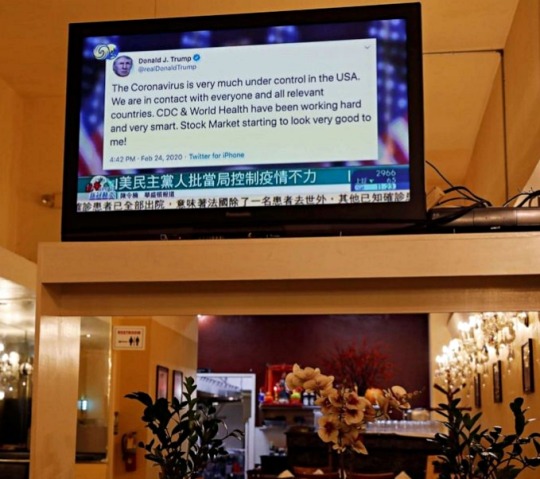
People were not buying Trump's claims but they were buying PPE.
I took this picture at CVS on February 26th that year.
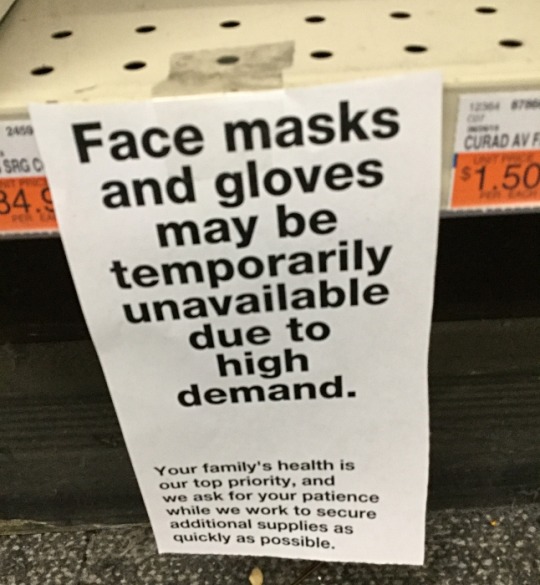
The stock market which Trump in his February tweet claimed looked "very good" was tanking on March 12th – the day before his state of emergency declaration.
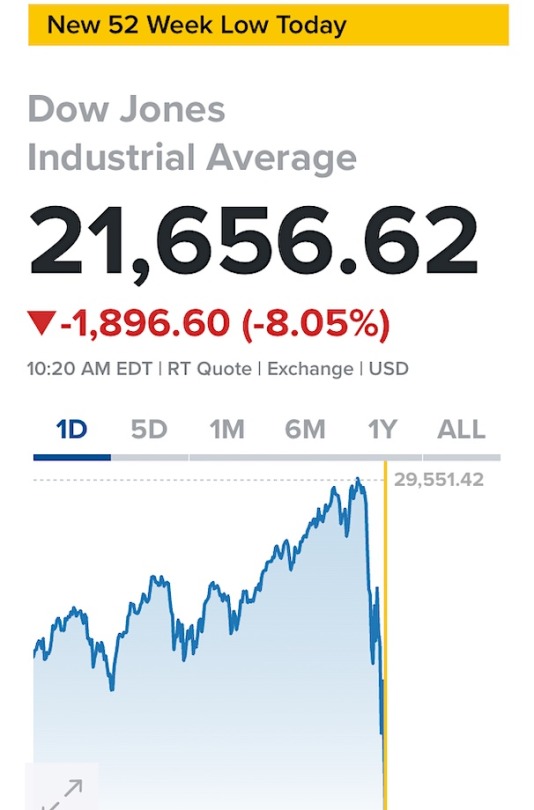
Trump succeeded in sending the US economy into recession much faster than George W. Bush did at the end of his term – quite a feat!. (As an aside, every recession in the US since 1981 has been triggered by Republican presidents.)
Of course Trump never stopped trying to downplay the pandemic nor did he ever take responsibility for it. The US ended up with the highest per capita death rate of any technologically advanced country.
Precious time was lost while Trump dawdled. Orange on this map indicates COVID infections while red indicates COVID deaths. At the time Trump declared a state of emergency, the virus had already spread to 49 states.

The United States could have done far better and it certainly had the tools to do so.
The Obama administration had limited the number of US cases of Ebola to under one dozen during that pandemic in the 2010s. Based on their success, they compiled a guide on how the federal government could limit future pandemics.
Obama team left pandemic playbook for Trump administration, officials confirm
Of course Trump ignored it.
Unlike those boxes of nuclear secrets in Trump's bathroom, the Obama pandemic limitation document is not classified. Anybody can read it – even if Trump didn't. This copy comes from the Stanford University Libraries.
TOWARDS EPIDEMIC PREDICTION: FEDERAL EFFORTS AND OPPORTUNITIES IN OUTBREAK MODELING
Feel free to share this post with anybody who still feels nostalgic about the Trump White House years!
#covid-19#coronavirus#pandemic#public health#donald trump#trump's incompetent response to the pandemic#covid state of emergency#2020#trump recession#51 days of trump pandemic dawdling#obama pandemic playbook#2010s ebola outbreak#nostalgia for trump administration#republicans#election 2024#vote blue no matter who
113 notes
·
View notes
Text
Roque Planas at HuffPost:
Immigration and Customs Enforcement arrests surged the week after President Donald Trump took office, with arrests Sunday totaling nearly 1,000 in a coordinated operation with other federal law enforcement agencies. The highly publicized spike in ICE arrests marks the beginning of Trump’s efforts to create a deportation machine of unprecedented magnitude in the modern era, and a profound shift from his predecessor’s more lenient approach toward deportations from the interior.
White House Border Czar Tom Homan oversaw operations personally in Chicago, accompanied by celebrity talk show psychologist Dr. Phil McGraw, who interviewed an arrested Thai migrant he identified as Sam Seda. Homan said that Seda was convicted of sex crimes involving children. HuffPost could not immediately confirm what charges the man had faced, and ICE did not immediately respond to a request for details about his case. A tired-looking McGraw slowly questioned the man about his history and place of birth, with long pauses between questions. The man said his mother was a citizen and that he was born in Thailand. When McGraw asked what he had been charged with, the man said he wanted to speak with his lawyer.
“You’re Dr. Phil?” the man asked at one point. “I’ve seen ‘Dr. Phil’ on TV.” The coordinated series of arrests, carried out with assistance from the FBI, the Drug Enforcement Administration, the U.S. Marshals Service and the Bureau of Alcohol, Tobacco, Firearms and Explosives, targeted people accused of serious crimes, according to ICE, which throughout the week posted a series of profiles of arrestees and their convictions or charges to its X account. ICE noted Sunday that it targeted Chicago specifically. Other ICE operations also targeted Atlanta, Puerto Rico, Colorado and Austin, Texas, according to CNN. Homan has repeatedly criticized Democratic-led cities and states like those targeted for attempting to limit cooperation with federal immigration enforcement.
[...] One of the major reasons why such a wide gulf separates the two presidents’ interior deportation figures is that Biden generally followed prosecutorial discretion guidelines that prioritized deporting people who presented a national security risk, those with serious criminal records and those who had a history of prior immigration offenses. Prosecutorial discretion was responsible for reducing interior removals from a peak of 871,901 under Barack Obama’s first term to 370,585 in his second.
Trump did away with prosecutorial discretion during his first term, however, leading interior removals to creep back up again until the COVID-19 pandemic slowed them down. Trump did away with prosecutorial discretion policies again last week shortly after taking office.
In recent days, 47’s cruel broad-scale mass deportations policy have officially have begun. The disgraceful ICE raids have also targeted innocent migrants who have obeyed laws and were productive members of society.
#ICE Raids#Immigration#Mass Deportations#Thomas Homan#Donald Trump#Trump Administration II#ICE#Immigration and Customs Enforcement#Dr. Phil McGraw#Sam Seda
17 notes
·
View notes
Text
Biden, CDC silent as North Carolina lawmakers vote to ban masks
Biden's White House has made everyday survival hell for disabled people. Now the last tool in the toolbox is being targeted with zero pushback.
This week, North Carolina Republicans are voting to ban wearing masks in public. The bill passed in the State House easily, was amended and passed in the State Senate, and will next return to the House for a vote on the amended bill. The Republicans also hold a supermajority that could overturn a veto, and killed a Democratic amendment to allow masking for health reasons. Hot on the heels of student encampments demanding that universities divest from weapons’ manufacturers responsible for mass murder in Gaza, Republicans jumped at the chance to criminalize two of their favorite punching bags, leftists and medically vulnerable people. Disabled people and allies have met the news with chagrin, as Republicans carry out the long-predicted next step in their war on medically vulnerable people appearing in public and remaining alive. Unfortunately, as Joe Biden jokes about refusing to put his mask on after a known COVID exposure, and left/labor pundits ignore the topic altogether, “allies” are few and far between. This combination of aggressive targeting and utter lack of solidarity is leaving those who rely on one-way masking to survive more at-risk than ever before.
[...]
Since it became clear (2021-22) that vaccines would not halt COVID transmission, that the virus would quickly mutate around vaccine protection, and that herd immunity would never be achieved, our government and media have worked assiduously to normalize constant reinfections and stigmatize those who object. People who suggest that it is the governments’ role to mitigate disease are painted as annoying and weak, a narrative that came directly from libertarian think tanks. Those who attempt to protect themselves in the face of harsh abandonment are painted as paranoid and mentally ill. What happened in North Carolina today is the unsurprising result of that years-long propaganda campaign. Masks are a critical tool to protect disabled people from COVID, but many people either bought into anti-mask propaganda, or do not think COVID is dangerous. For a leftist- someone who expresses belief in community care and solidarity- being unmasked doesn’t only convey the sentiment “I don’t think I can be disabled by COVID,” it also broadcasts the accusation, “I don’t believe you can be disabled by COVID.” Being unmasked while COVID spreads unmitigated is an insistence on ones’ inalienable right to expose others to COVID without their consent. Meanwhile, the latest CDC Household Pulse Survey found 17 million Americans currently living with Long COVID, and approximately 3 in 10 reporting having had Long COVID symptoms at one point. Viral persistence is currently a leading hypothesis for the development of post-COVID disease, and “persistence of SARS-CoV-2 RNA or particles in multiple tissues for prolonged periods in patients following SARS-CoV-2 infection, particularly in patients with long COVID, is now well documented.” Mounting research shows that every COVID infection significantly damages cognitive function. Research led by Dr. Akiko Iwasaki at Yale School of Medicine continues to find immune dysregulation following COVID, and studies point to a 40% increased risk of developing autoimmune conditions after COVID. And it’s long been established that COVID substantially increases your risk of heart attacks, strokes, and other cardiovascular complications.
[...]
But Democrats continue to stand behind their failed “vaccine-only” strategy (now, without vaccines!) because of the political impossibility of attempting to pivot. Plus, when you’ve had such blinding success mainstreaming far-right beliefs about illness building the immune system and public health being a personal choice, why change horses now?
50 notes
·
View notes
Text
AK Press made some of their e-books free for a little while. These are the free ones.
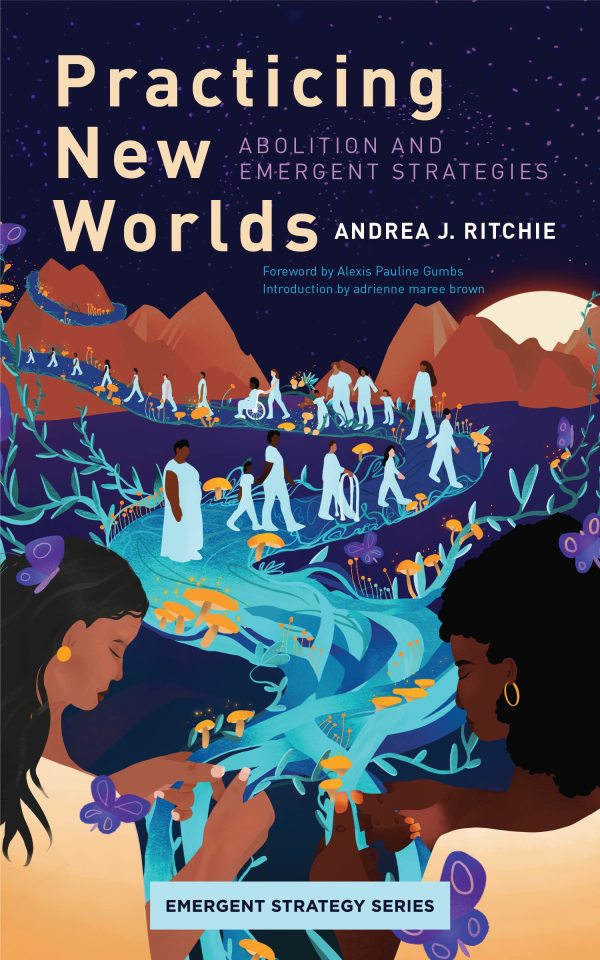
An exploration of how emergent strategies can help us meet this moment, survive what is to come, and shape safer and more just futures.
Practicing New Worlds explores how principles of emergence, adaptation, iteration, resilience, transformation, interdependence, decentralization and fractalization can shape organizing toward a world without the violence of surveillance, police, prisons, jails, or cages of any kind, in which we collectively have everything we need to survive and thrive.
Drawing on decades of experience as an abolitionist organizer, policy advocate, and litigator in movements for racial, gender, economic, and environmental justice and the principles articulated by adrienne maree brown in Emergent Strategy: Shaping Change, Changing Worlds, Ritchie invites us to think beyond traditional legislative and policy change to create more possibilities for survival and resistance in the midst of the ongoing catastrophes of racial capitalism—and the cataclysms to come. Rooted in analysis of current abolitionist practices and interviews with on-the-ground organizers resisting state violence, building networks to support people in need of abortion care, and nurturing organizations and convergences that can grow transformative cities and movements, Practicing New Worlds takes readers on a journey of learning, unlearning, experimentation, and imagination to dream the worlds we long for into being.
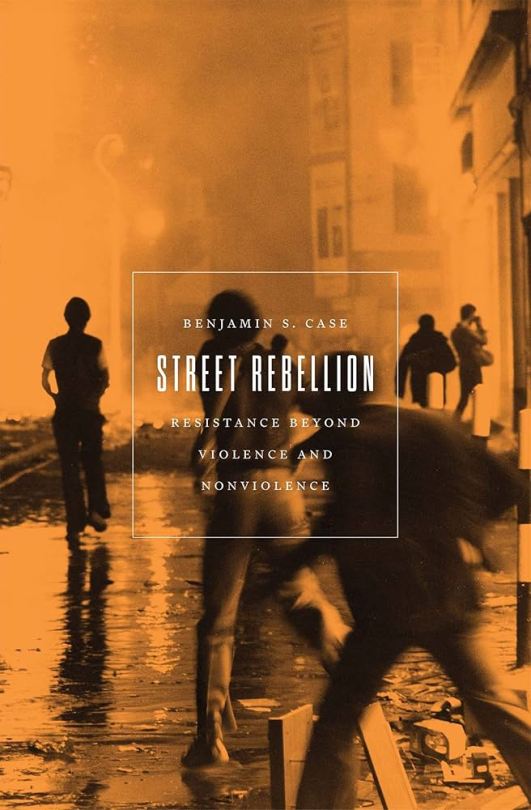
In a style that bridges the divide between academia and activism, Street Rebellion develops a broader and more accurate understanding of how people struggle for liberation.
We are living in a time of uprisings that routinely involve physical confrontation—burning vehicles, barricades, vandalism, and scuffles between protesters and authorities. Yet the Left has struggled to incorporate rioting into theories of change, remaining stuck in recurring debates over violence and nonviolence. Civil resistance studies have popularized the term “strategic nonviolence,” spreading the notion that violence is wholly counter-productive. Street Rebellion scrutinizes recent research and develops a broad and grounded portrait of the relationship between strategic nonviolence and rioting in the struggle for liberation.
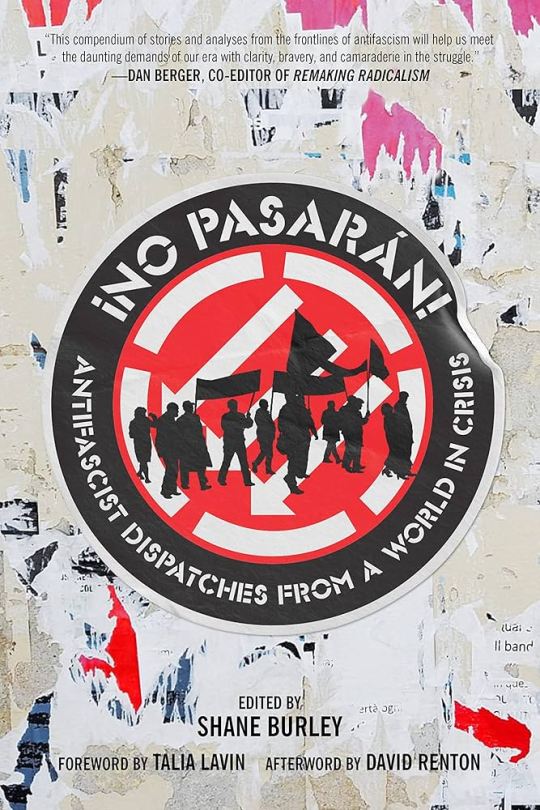
¡No Pasarán! is an anthology of antifascist writing that takes up the fight against white supremacy and the far-right from multiple angles. From the history of antifascism to today's movement to identify, deplatform, and confront the right, and the ways an insurgent fascism is growing within capitalist democracies, a myriad of voices come together to shape the new face of antifascism in a moment of social and political flux.
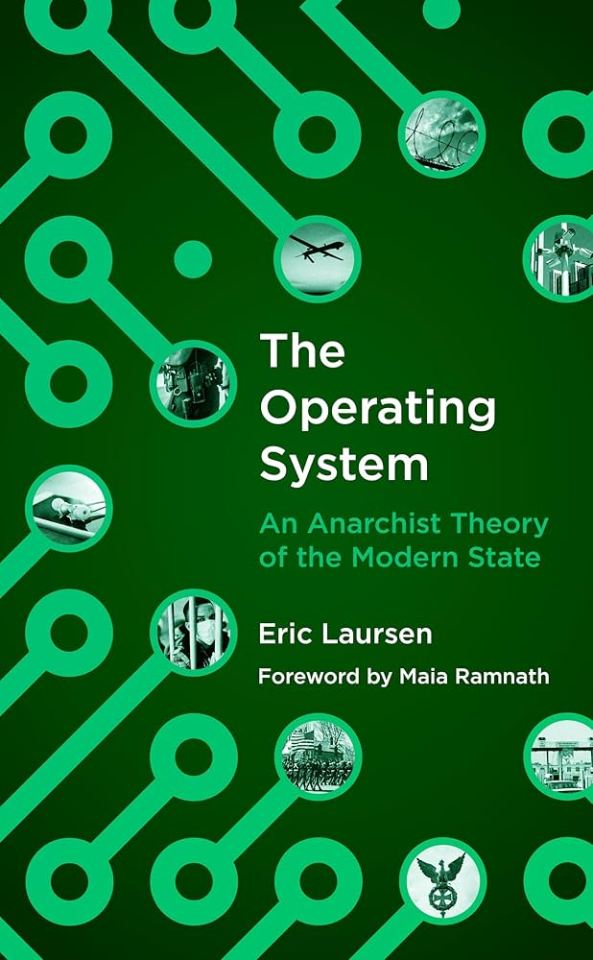
One of the most unique aspects of anarchism as a political philosophy is that it seeks to abolish the state. But what exactly is “the state”? The State is like a vast operating system for ordering and controlling relations among human society, the economy, and the natural world, analogous to a digital operating system like Windows or MacOS. Like a state, an operating system “governs” the programs and applications under it and networked with it, as well as, to some extent, the individuals who avail themselves of these tools and resources. No matter how different states seem on the surface they share core similarities, namely:
* The State is a relatively new thing in world history
* The State is European in origin and outlook
* States are “individuals” in the eyes of the law
* The State claims the right to determine who is a person
* The State is an instrument of violence and war
* The State is above the law
* The State is first and foremost an economic endeavor
Anyone concerned with entrenched power, income inequality, lack of digital privacy, climate change, the amateurish response to COVID-19, or military-style policing will find eye-opening insights into how states operate and build more power for themselves—at our expense. The state won’t solve our most pressing problems, so why do we obey? It’s time to think outside the state.
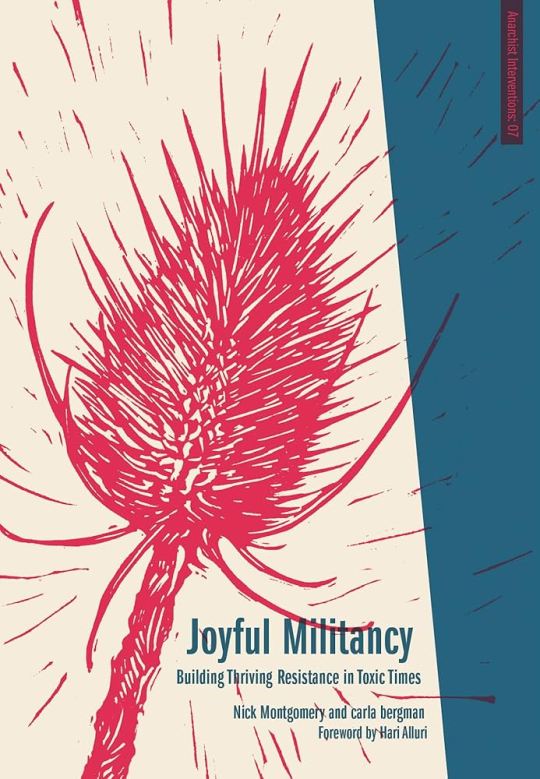
Joyful Militancy investigates how fear, self-righteousness, and moralism infiltrate and take root within liberation movements, what to do about them, and ultimately how tenderness and vulnerability can thrive alongside fierce militant commitment.
Why do radical movements and spaces sometimes feel laden with fear, anxiety, suspicion, self-righteousness, and competition? Montgomery and bergman call this phenomenon rigid radicalism: congealed and toxic ways of relating that have seeped into social movements, posing as the “correct” way of being radical. In conversation with organizers and intellectuals from a wide variety of political currents, the authors explore how rigid radicalism smuggles itself into radical spaces, and how it is being undone
Interviewees include Silvia Federici, adrienne maree brown, Marina Sitrin, Gustavo Esteva, Leanne Betasamosake Simpson, Walidah Imarisha, Margaret Killjoy, Glen Coulthard, Richard Day, and more.
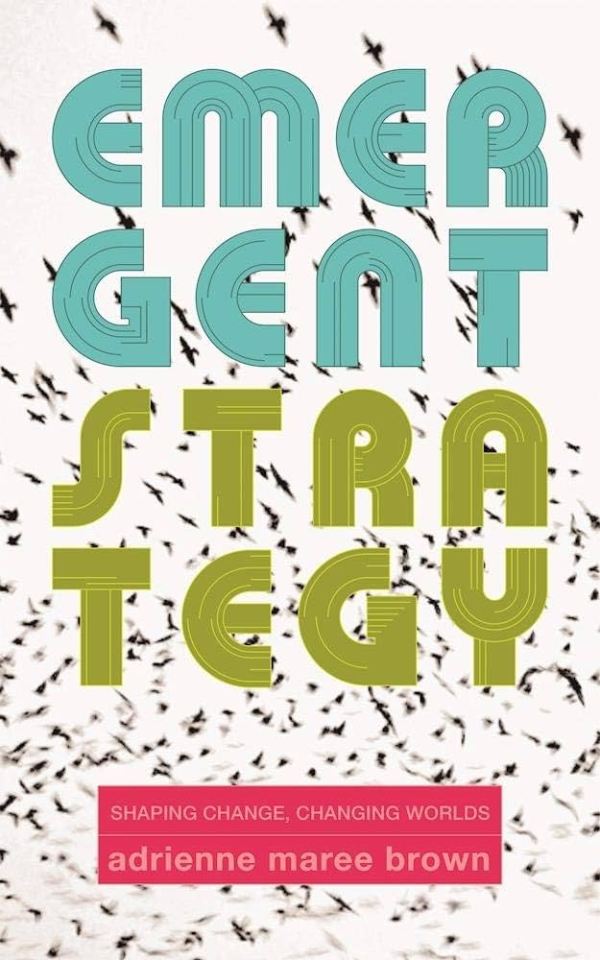
Self-help, society-help, and planet-help to shape the futures we want. A resolutely materialist spirituality based equally on science and science fiction: a wild feminist and afro-futurist ride!
Inspired by Octavia Butler's explorations of our human relationship to change, Emergent Strategy is radical self-help, society-help, and planet-help designed to shape the futures we want to live. Change is constant. The world is in a continual state of flux. It is a stream of ever-mutating, emergent patterns. Rather than steel ourselves against such change, this book invites us to feel, map, assess, and learn from the swirling patterns around us in order to better understand and influence them as they happen. This is a resolutely materialist “spirituality” based equally on science and science fiction, a visionary incantation to transform that which ultimately transforms us.
20 notes
·
View notes
Text
The accomplishments of Joe Biden during his presidency
Joe Biden, the 46th President of the United States, assumed office at a pivotal moment in history, facing a myriad of challenges ranging from a global pandemic to economic uncertainty and social unrest.
Throughout his presidency, President Biden has pursued an ambitious agenda aimed at addressing these pressing issues and advancing key policy priorities. In this essay, we will examine some of the notable accomplishments of Joe Biden during his time in office and the impact of his leadership on the nation.
One of the most significant accomplishments of President Biden during his presidency has been his administration's response to the COVID-19 pandemic. Upon taking office, President Biden made the pandemic a top priority and swiftly implemented a national strategy to combat the spread of the virus and accelerate the vaccination campaign.
Under his leadership, the administration successfully exceeded its initial goal of administering 100 million vaccine doses within the first 100 days, ultimately surpassing 200 million doses. This aggressive vaccination effort has been instrumental in curbing the spread of the virus and has contributed to a significant reduction in COVID-19 cases and deaths across the country.
In addition to his focus on public health, President Biden has made substantial strides in revitalizing the American economy in the wake of the pandemic. The administration's American Rescue Plan, a comprehensive COVID-19 relief package, provided much-needed financial assistance to individuals, families, and businesses impacted by the economic downturn. The plan included direct stimulus payments to Americans, extended unemployment benefits, support for small businesses, and funding for vaccine distribution and testing.
President Biden's economic agenda has also centered on job creation and infrastructure investment, culminating in the passage of the Bipartisan Infrastructure Law, a historic legislation that allocates substantial funding for modernizing the nation's infrastructure, creating millions of jobs, and bolstering economic growth. Furthermore, President Biden has been a vocal advocate for advancing racial equity and social justice in the United States. His administration has taken concrete steps to address systemic inequalities and promote inclusivity, including the signing of executive orders to combat discrimination, promote fair housing, and strengthen tribal sovereignty.
Additionally, President Biden signed into law the Juneteenth National Independence Day Act, establishing Juneteenth as a federal holiday to commemorate the end of slavery in the United States. These actions underscore the administration's commitment to confronting the legacy of racism and fostering a more equitable society for all Americans.
Moreover, President Biden has demonstrated a strong commitment to combating climate change and advancing environmental sustainability.
His administration rejoined the Paris Agreement on climate change, signaling a renewed dedication to global cooperation in addressing the climate crisis. In November 2021, President Biden convened a virtual Leaders Summit on Climate, bringing together world leaders to discuss ambitious measures to reduce greenhouse gas emissions and accelerate the transition to clean energy.
Additionally, the administration has unveiled a comprehensive plan to invest in clean energy infrastructure, promote energy efficiency, and prioritize environmental justice, aiming to position the United States as a global leader in the fight against climate change.
In the realm of foreign policy, President Biden has sought to reassert American leadership on the world stage and rebuild alliances with international partners. His administration has prioritized diplomacy and multilateral engagement, working to address global challenges such as nuclear proliferation, cybersecurity threats, and human rights abuses.
President Biden has reaffirmed the United States' commitment to NATO and other key alliances, signaling a departure from the isolationist policies of the previous administration. His approach to foreign affairs has emphasized the importance of collaboration and collective action in tackling shared global concerns, fostering a more cohesive and cooperative international order. Furthermore,
President Biden has been a steadfast proponent of expanding access to affordable healthcare and strengthening the Affordable Care Act. His administration has taken steps to bolster the ACA, including increasing enrollment outreach, expanding coverage options, and lowering healthcare costs for millions of Americans.
President Biden has also championed efforts to address mental health challenges and substance abuse disorders, recognizing the critical importance of mental and behavioral health in overall well-being.
In conclusion, President Joe Biden has achieved a range of significant accomplishments during his tenure in office, from his swift and effective response to the COVID-19 pandemic to his ambitious efforts to revitalize the economy, promote racial equity, combat climate change, and reinvigorate America's role in global affairs.
His leadership has been marked by a steadfast commitment to addressing pressing domestic and international challenges and advancing a progressive policy agenda aimed at fostering a more equitable, resilient, and prosperous future for the nation. As his presidency continues to unfold, the enduring impact of his accomplishments is likely to shape the trajectory of the United States for years to come, leaving a lasting imprint on the fabric of American society and the global community.
#politics#donald trump#joe biden#potus#scotus#heritage foundation#trump#democracy#democrats#republicans#maga morons#maga cult#maga#usa#us news#white house#biden#the united states#usa politics
44 notes
·
View notes
Text
ASAN is deeply troubled by reports made by The Washington Post this Tuesday that the CDC is planning to change its COVID-19 isolation guidelines. ASAN condemns the potential new guidelines, which would remove the five-day isolation period currently recommended after a positive test for COVID-19. Instead, people with a positive test result would not need to isolate if they have been fever-free for at least 24 hours without the aid of medication.
ASAN has spoken repeatedly on the failures of the US government to respond adequately to COVID-19. Despite the ongoing pandemic, the end of the public health emergency and subsequent Medicaid unwinding have been devastating to the disability community and other marginalized communities. Efforts to encourage adherence to masking guidance and improve indoor air quality have been underwhelming. Through their actions, the CDC and US Government as a whole have indicated the strategy to combat COVID-19 is seemingly a vaccine-only response, but, with adult uptake of the latest bivalent booster being only 21.9%, even these efforts are beyond inadequate.
This change is particularly alarming given who is likely to be among the most impacted. Changing the isolation window disproportionately exposes and affects vulnerable populations such as disabled and immunocompromised people, older adults, and other high-risk groups. These guidelines would increase COVID-19 exposure and make people at high risk of poor outcomes from COVID-19 less safe in a range of public and private spaces.
Asymptomatic spread remains a serious concern with the latest variants. Reduced access to at-home and PCR testing since the end of the public health emergency contributes to transmission. Removing the isolation window adds increased pressure to return to school and work while potentially infectious. This will disproportionately affect individuals with hourly jobs that must be performed in person and families with children that are lower-income and families of color, as many communities aggressively enforce truancy laws against these households. Counting on the availability of treatments like Paxlovid as a mitigation strategy is highly inequitable as racial and ethnic disparities in outpatient treatment of COVID-19 remain prevalent. An approach to COVID-19 that accepts widespread and repeated infection leaves the most vulnerable among us unprotected. As we have seen throughout the pandemic, it has also led to the emergence of new variants, putting our communities at additional risk. Each repeated infection increases an individual’s likelihood of developing Long COVID, a potentially lifelong disability with limited treatment options.
The CDC has continually failed to take into account disabled people when making COVID-19 policies and regulations. The CDC is moving in the wrong direction by reducing COVID-19 isolation periods. Instead, it should release improved guidelines to promote masking and increase availability, accessibility, and understanding of vaccines, testing, and treatment. States and the federal government also must address the continued effects of the pandemic and the end of the public health emergency on health care access and home and community based services, make investments in improving indoor air quality and preventing and treating Long COVID, and address the economic and human impacts of this crisis. ASAN condemns the possible shortening of isolation guidelines and will continue to hold the federal government accountable for protecting the public from the ongoing risk of COVID-19.
73 notes
·
View notes
Text
The Pretty Average Trump Trauma
I really picked the wrong week to have a controversial post go viral.
The appeal deadline for my disability case is very soon and we just recently got the last of the medical records. My lawyer can get very busy and hard to reach. And I have been freaking out trying to get a hold of him to make sure everything is ready to be submitted. Thankfully he just emailed and said everything is on track and will be sent in for the appeal.
But having this weighing on me behind the scenes while also dealing with the blowback from my "vote for Biden" post caused me to enter into some unhealthy arguments and lose my temper on several occasions.
I didn't actually think about what would happen if that post went viral. Sometimes I write things and a hundred people see it, and it serves as a catharsis because I was able to get my thoughts and fears out of my brain.
And sometimes it gets reblogged 6000 times and I can forget I have a platform where that happens from time to time.
I wish I had written a better initial post. I think my thoughts in subsequent posts, along with the inclusion of what I think is a better strategy, would have gone a long way to help people understand my point of view. Looking back, that original post feels incomplete.
The post that ended up going viral was not inspired by reason or logic and it was never really meant to convince anyone of anything.
I thought I was preaching to the choir.
It was a representation of my fears. It was the result of two years of panic and trauma from the pandemic which ended in my mother's horrible death.
Let me explain...
On November 9th, Shaun, a YouTuber I respect, posted this.

And it scared the hell out of me.
A very popular leftist with a huge platform wrote this to 5 million people and I freaked out.
Shaun wasn't necessarily saying not to vote for Biden at the time. But he thinks people should all say they won't vote for him unless he calls for a ceasefire. I get the strategy. But I feared that nuance would be lost on many people and they would only see it as "don't vote for Biden... no matter what." Which was an accurate prediction on my part. The guy from Eve 6 has been going nuance-free for weeks now.
The one thing I greatly disagree with Shaun about is this...

Before the pandemic, I might have understood his argument. For the first two years, Trump was mostly an ineffectual goof. He had trouble getting a lot of his worst ideas to manifest. Most of the border wall he built ended up being repairs of existing barriers. And Obama droned civilians and kept kids in cages too—though Trump kept them in cages indefinitely and made up a rule that we can't actually know how many civilians he was droning.
So, a lot of the same, but turned up to 11.
But nothing about the pandemic response was pretty average.
There is something I have been choosing not to say during all of these discussions. I felt like saying it would be poor timing. I was worried people wouldn't actually agree with me. I worried it would make people think I was turning suffering into a competition. I didn't want to make it look like I valued certain lives over others. But then people accused me of all of that anyway. I was called evil and a collaborator and a supporter of genocide.
So I'm going to talk about it. Because the fact that few have mentioned it in these discussions has been bothering me. And the fact that the majority of society does not mention it makes me feel very alone in this belief.
I have long believed Trump and the majority of US conservatives committed a genocide of the disabled and elderly. I was never really comfortable calling it that word. I wasn't really sure how a genocide got classified as such. So I would just say things like, "40% of people who died during COVID should still be alive" and "Trump is responsible for hundreds of thousands of COVID deaths" and "Trump killed my mom" and hoping people would make the connection or at least see it as mass murder. I mean, this country judges everything by how many "9/11s" something is, but not the pandemic?
Donald Trump was the leader of the Republican party. When he refused to wear a mask due to vanity, his followers looked for something to excuse him. And I feel that directly birthed the "masks don't work" movement among conservatives. Donald Trump, having enormous influence among his acolytes, refused to correct this dangerous rhetoric. And he probably welcomed the cover so he could continue going maskless and not smear his makeup—even after he nearly died.
It is my belief this was the beginning of a genocide of apathy, deliberate and accidental incompetence, and non-compliance. And the reason for that non-compliance was not freedom as many claimed.
Conservatives did not like being inconvenienced.
They didn't like having to consider others.
And if competence requires effort and vigilance, they'd prefer doing the bare minimum.
Trump was famous for not filling vital administrative positions in the executive branch. Not only that, his turnover rate was 5 times higher than previous administrations. People were asked to do the job of several people because they didn't staff properly, and so those people quit. Thus creating a cycle of inexperienced new-hires that were out of their depth and asked to do much more than they bargained for. There is no way they could succeed in their jobs.
I think people forget that part of the role of the executive is the day-to-day boring administrative shit that is required to run a country. And when this day-to-day work isn't valued, it creates a crisis of incompetence. Which then creates things like not enough tests, not enough testing, Trump saying "if you don't test, it doesn't count", botched vaccine rollouts, rampant misinformation, poor education of the populace, and abysmal improvised press conferences where the President does a quick riff on injecting bleach.
This competence aspect is one of the hugest reliefs I had with the Biden administration. Not Biden. Not his policies. I'm talking about the regular workers getting shit done. This is the reason I am desperate to get my shit worked out with Social Security before the election. I once called Social Security during the pandemic and I literally got a recording saying to try calling back the next month.
Trump didn't care. People criticized him for not hiring people. He was aware of the problem. He just did nothing about it. And many conservatives praised him for "trimming the fat" or whatever. This idea that all of these government workers were useless burdens on the taxpayer fell apart during the pandemic.
There is incompetence caused by ignorance but it can also be a deliberate act. Trump was extraordinary in all forms of incompetence. He wasn't qualified to manage a pandemic. But he could have easily appointed experts and then gotten out of the way. But his narcissism would not let him cede power to anyone. He has always been convinced "only Trump can save you" and so his ego helped kill nearly half a million people.
Once the incompetence ball got rolling, that's when malicious apathy reared its ugly head. It was time to choose who they cared least about dying—who they felt was most useless. Conservatives decided it was time to devalue lives and start making sacrifices to save politicians' money laundering fronts small businesses.
Popular conservatives were going on TV and saying it was okay if Grandma died. It would be a worthy sacrifice to protect our freedoms.
The Lt. Governor of Texas, Dan Patrick, basically offered up the elderly for sacrifice all while claiming that he spoke for them and was also willing to die. Though I don't take his personal willingness very seriously, since he has the money and resources to get the best medical care and probably had no expectation he was in any danger.
“No one reached out to me and said, ‘As a senior citizen, are you willing to take a chance on your survival in exchange for keeping the America that all America loves for your children and grandchildren?’ But if they had? If that is the exchange, I’m all in. So my message is let’s get back to work. Those of us who are 70-plus, we’ll take care of ourselves.”
But you cannot just sacrifice the elderly. You may justify it by saying they have lived a long life, but many of the same health risks were shared by the disabled. Many of whom still had normal lifespans, but just needed extra care and protection.
There are countless elderly who cannot "take care of themselves" but they are still of value to our society. They are still loved. They watch and teach their grandchildren. They are the keepers of the family stories. They bake cookies and give you two dollar bills. They have random bowls of butterscotch all throughout their house.
But some need help. Some are sick. Some can't drive. Some can't walk. I guarantee not all of them were prepared to die for the cause.
And none deserved to die for a sports bar.
Oh, didn't I mention?
Dan Patrick owned a chain of sports bars that were losing money from the lockdowns. Did you really think he was sacrificing old folks "for the children"?
Thankfully Dan's sports bars are gonna be okay. He ended up receiving a $179,000 PPP loan... that was forgiven.
Then they started saying COVID deaths weren't COVID deaths.
"Well, they had a bad heart." "They were obese." "They had cancer."
They dropped the elderly excuse and began to openly devalue the disabled as well. If you were sick, what good were you? They considered us the next sacrifices for their convenience. If we wanted to survive, we shouldn't have gotten sick. It didn't matter that we could survive for years or even have a normal lifespan as long as we were protected by our communities.
And then began the non-compliance.
Trump's followers ignored masks and lockdowns and eventually vaccines. They were unwilling to protect the vulnerable and so many of us just... died.
Again, 40% of the US COVID deaths could have been prevented. Hundreds of thousands of people should still be here. Malicious apathy, incompetence, and non-compliance were the direct cause of this genocide.
The United Nations Genocide Convention identified 5 acts that typically constitute genocide. Only one act is required and in the pandemic 3 of the 5 acts happened.
Killing members of a group. Causing members of a group serious bodily harm. Imposing living conditions on that group that would destroy them.
I'm looking at that third one just now and realizing why we have advocates to remind us of vulnerable groups that need protection. I was thinking about how the elderly and disabled were trapped in hyper-contagious nursing homes and care facilities, but I completely forgot about prisons and the concentration camps at the borders.
I am not trying to diminish the awful things happening in Palestine right now. This is not a comparison of suffering—but a reminder. When a current terrible thing is happening, it can be hard to focus on anything else. But I do wish more people recognized what happened as a genocide and that the leader of that genocide, the one with the power to stop it, was Donald Trump. If we are going to base this voting decision entirely on acts of genocide, why is this not part of the consideration?
It is an awful moral calculus we have to figure out. One president is supporting and asking for funding for a genocide and I feel the other was the direct cause of another genocide. That's why I said both choices sucked. And the only way I could resolve this moral calculation was by asking what path would cause the least harm for everyone involved.
And the most disappointing aspect of all of these debates was the ableism. People told me if Trump was elected and I lost my benefits I should grow my own food and learn about medicine. They said I valued disabled lives above those in Gaza. They told me to imagine myself in Nazi Germany as a collaborator despite the fact I would have been euthanized.
But I felt like they weren't considering the disabled at all.
I am a disability advocate. So of course I am going to remind people to consider us in their voting decisions. But I'm tired of hearing I value lives differently just because I speak on behalf of a vulnerable group more often. I'm tired of continually having to justify my existence. And I'm tired of people dismissing the very real trauma caused by Trump.
It was not pretty average.
I'd like to tell you the full story of my mother's passing. All of the details. Even the ones I can't bear to type. But this isn't just my story. This is the story of countless others who had to watch their loved ones slowly die behind glass or over the phone or on an iPad.
I spent two years in constant anxiety trying to protect my two very sick parents. It was always assumed that my father was the most at risk. And that he was probably going to die long before my mother. But she had started a treatment for her psoriatic arthritis that turned the volume down on her immune system. Something that would normally not be a huge risk... but a pandemic changed that. A vaccine needs a functioning immune system to protect someone.
She could either accept the agony of stopping treatment or risk getting COVID. If people would have been willing to protect her, it would have been an easier choice. And she would still be around today. And I wouldn't have to worry about being homeless right now.
I don't know for sure when she was infected. I kept her inside as much as possible. But she needed those treatments and we had to pile into a crowded waiting room every time. And I remember a man in his fifties who seemed preoccupied with having to wear a mask. And when he thought no one was looking, he'd pull it down below his nose. A few days later she was being taken away in an ambulance.
A few weeks before my mother died, she called me on the phone. She was heavily medicated and they had two different breathing devices assisting her. The nurse was holding the phone up to her ear and she was trying to speak over the volume of the air rushing into her face from the masks. I could not hear her no matter how loud she yelled. So she asked the nurse to take the masks off for just a second so we could talk.
Her only concern was for my father. We all contracted COVID and she was so worried he would end up just like her. Thankfully the vaccine worked for him and he was okay at that moment. But she kept yelling, "Is Dad okay? Is Dad okay?" And I kept trying to tell her he was fine, but she was hard of hearing and the phone could not be held very close to her ear.
Unfortunately, the yelling made it harder and harder for her to breathe. She started gasping for air. The nurse kept insisting she put the breathing equipment back on, but my mom refused. "I want to talk to my son! I need to talk to my son!"
I knew there wasn't much we could do to communicate. And so I kept trying to yell "I love you, Mom. Everyone is fine. I love you!" I then asked the nurse to tell her that. And when she finally understood what I was saying, she burst into tears.
Her oxygen levels were getting dangerously low and she was fighting the nurse. And she just yelled out, "I'm so scared! I think I'm going to die! Tell Dad I'm sorry I can't take care of him! I don't want to die!" She kept repeating that over and over. The nurse had no choice and had to put the masks back on. My mom screamed and shouted "No! Please no! That's my son!"
And those were the last words I ever heard from my mother.
Gasping for air. Scared of dying. Worried about her family.
This moment has intrusively popped into my brain on a regular basis since it happened. It happens when I'm awake. It happens in my dreams. I have no control over it. I just have to keep experiencing it like it is happening for the first time.
After I saw that tweet from Shaun and then many others expressing the same thing (without the strategic aspect), my dread and trauma resurfaced with a vengeance. I've been reliving my mom's final words in my dreams. That moment keeps popping into my head. I feared the man I feel is most responsible for my mother's death may regain power and kill me and the last of the family I have left.
I keep asking myself the same questions over and over. What if there is another public health emergency? What happens to my trans friends if he turns the US into Florida and Texas? What will happen to the migrants at the border?
All I have is my two best friends. Katrina is gay and Delling is trans and disabled. All of us are vulnerable.
I wrote that post to help deal with the nightmares. Writing is part of my coping process. I didn't really expect it to go super viral. I just needed to get that out of my brain. But when people pushed back and started calling me evil and a collaborator and that I was valuing my life above those in Palestine, all with a huge heap of ableism, I found myself unable to let it go and not respond. I couldn't choose the healthy thing and step away.
While I feel I made some good arguments and put forth some solid ideas for other ways to handle this, I also got angry and lost my temper and stayed in arguments for way too long—all to my mental detriment.
My little world felt like it was collapsing and the world at large also felt like it was collapsing. I had personal horrors in my mind mixing with the horrors of this global conflict.
It was too much.
I don't regret what I posted. Many felt the same as I do. And I think my subsequent posts did a good job of expanding on my thoughts while also offering hope for alternate solutions.
But I do regret the timing and I wish I hadn't lost my temper. Especially in a reply I left with a lot of cussing.
People might disagree but I am hoping that people can understand the fear and trauma that influences my point of view.
I am actually willing to risk quite a lot to protect other people. Even people in faraway lands I don't know.
But I refuse to offer up the vulnerable to be sacrificed if it won't actually help anyone. That's what a Texas Lt. Governor would do.
108 notes
·
View notes
Text
Since it was first identified in 1983, HIV has infected more than 85 million people and caused some 40 million deaths worldwide.
While medication known as pre-exposure prophylaxis, or PrEP, can significantly reduce the risk of getting HIV, it has to be taken every day to be effective. A vaccine to provide lasting protection has eluded researchers for decades. Now, there may finally be a viable strategy for making one.
An experimental vaccine developed at Duke University triggered an elusive type of broadly neutralizing antibody in a small group of people enrolled in a 2019 clinical trial. The findings were published today in the scientific journal Cell.
“This is one of the most pivotal studies in the HIV vaccine field to date,” says Glenda Gray, an HIV expert and the president and CEO of the South African Medical Research Council, who was not involved in the study.
A few years ago, a team from Scripps Research and the International AIDS Vaccine Initiative (IAVI) showed that it was possible to stimulate the precursor cells needed to make these rare antibodies in people. The Duke study goes a step further to generate these antibodies, albeit at low levels.
“This is a scientific feat and gives the field great hope that one can construct an HIV vaccine regimen that directs the immune response along a path that is required for protection,” Gray says.
Vaccines work by training the immune system to recognize a virus or other pathogen. They introduce something that looks like the virus—a piece of it, for example, or a weakened version of it—and by doing so, spur the body’s B cells into producing protective antibodies against it. Those antibodies stick around so that when a person later encounters the real virus, the immune system remembers and is poised to attack.
While researchers were able to produce Covid-19 vaccines in a matter of months, creating a vaccine against HIV has proven much more challenging. The problem is the unique nature of the virus. HIV mutates rapidly, meaning it can quickly outmaneuver immune defenses. It also integrates into the human genome within a few days of exposure, hiding out from the immune system.
“Parts of the virus look like our own cells, and we don’t like to make antibodies against our own selves,” says Barton Haynes, director of the Duke Human Vaccine Institute and one of the authors on the paper.
The particular antibodies that researchers are interested in are known as broadly neutralizing antibodies, which can recognize and block different versions of the virus. Because of HIV’s shape-shifting nature, there are two main types of HIV and each has several strains. An effective vaccine will need to target many of them.
Some HIV-infected individuals generate broadly neutralizing antibodies, although it often takes years of living with HIV to do so, Haynes says. Even then, people don’t make enough of them to fight off the virus. These special antibodies are made by unusual B cells that are loaded with mutations they’ve acquired over time in reaction to the virus changing inside the body. “These are weird antibodies,” Haynes says. “The body doesn’t make them easily.”
Haynes and his colleagues aimed to speed up that process in healthy, HIV-negative people. Their vaccine uses synthetic molecules that mimic a part of HIV’s outer coat, or envelope, called the membrane proximal external region. This area remains stable even as the virus mutates. Antibodies against this region can block many circulating strains of HIV.
The trial enrolled 20 healthy participants who were HIV-negative. Of those, 15 people received two of four planned doses of the investigational vaccine, and five received three doses. The trial was halted when one participant experienced an allergic reaction that was not life-threatening. The team found that the reaction was likely due to an additive in the vaccine, which they plan to remove in future testing.
Still, they found that two doses of the vaccine were enough to induce low levels of broadly neutralizing antibodies within a few weeks. Notably, B cells seemed to remain in a state of development to allow them to continue acquiring mutations, so they could evolve along with the virus. Researchers tested the antibodies on HIV samples in the lab and found that they were able to neutralize between 15 and 35 percent of them.
Jeffrey Laurence, a scientific consultant at the Foundation for AIDS Research (amfAR) and a professor of medicine at Weill Cornell Medical College, says the findings represent a step forward, but that challenges remain. “It outlines a path for vaccine development, but there’s a lot of work that needs to be done,” he says.
For one, he says, a vaccine would need to generate antibody levels that are significantly higher and able to neutralize with greater efficacy. He also says a one-dose vaccine would be ideal. “If you’re ever going to have a vaccine that’s helpful to the world, you’re going to need one dose,” he says.
Targeting more regions of the virus envelope could produce a more robust response. Haynes says the next step is designing a vaccine with at least three components, all aimed at distinct regions of the virus. The goal is to guide the B cells to become much stronger neutralizers, Haynes says. “We’re going to move forward and build on what we have learned.”
36 notes
·
View notes
Text

Long COVID represents the constellation of post-acute and long-term health effects caused by SARS-CoV-2 infection; it is a complex, multisystem disorder that can affect nearly every organ system and can be severely disabling. The cumulative global incidence of long COVID is around 400 million individuals, which is estimated to have an annual economic impact of approximately $1 trillion—equivalent to about 1% of the global economy. Several mechanistic pathways are implicated in long COVID, including viral persistence, immune dysregulation, mitochondrial dysfunction, complement dysregulation, endothelial inflammation and microbiome dysbiosis. Long COVID can have devastating impacts on individual lives and, due to its complexity and prevalence, it also has major ramifications for health systems and economies, even threatening progress toward achieving the Sustainable Development Goals. Addressing the challenge of long COVID requires an ambitious and coordinated—but so far absent—global research and policy response strategy. In this interdisciplinary review, we provide a synthesis of the state of scientific evidence on long COVID, assess the impacts of long COVID on human health, health systems, the economy and global health metrics, and provide a forward-looking research and policy roadmap.
25 notes
·
View notes